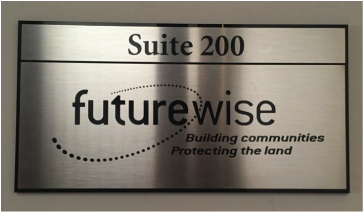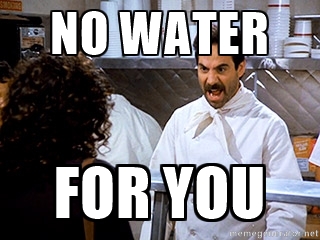The recent Washington State Supreme Court decision Hirst vs. W. Washington Growth Management Hearings Board (“Hirst”) (decision linked here if Court pulls it off their website)opens a new offensive against individual property rights and common sense; and it continues the trend of legislative rule making by our Supreme Court, where the Justices have habitually strayed from their judicial role into the realm of policy making from the bench. The ruling is disastrous for property rights, and it is a crowning achievement of decades of subterfuge by Futurewise (the prime plaintiff in this case, even though they were listed last), who together with like-minded groups, champion never-ending aggression and control of citizens via centralized planning.

To quote from the dissent (written by Justice Stephens):
“The majority’s decision hinges on an interpretation of RCW 19.27.097 that is unsupported by the plain language of the statute, precedent, or common sense.”
Let’s review the case and how we got here.
What is the Hirst case about?
Water. For decades, various elements of Washington State’s environmental movement have expressed anger and resentment about the potential for people to build homes in rural or suburban settings. The battle-axe used to keep people in line has been, up until Hirst, the Growth Management Act (GMA), which was passed, appropriately, on April Fool’s Day, 1990. The GMA had three effects. First, it set up a system of order and control for housing and
development. Second, it established a revenue generation system for local government to maintain and enforce control. Third, it

provided attachment points for environmental groups to litigate in order to maintain and expand government control over the most basic needs of the masses (i.e., housing). Ostensibly, the GMA was to benefit individuals by preventing urban sprawl, but in reality, only government benefited via increased control, by the addition of new revenue streams, and by providing backdoors for the government’s environmental allies to beat down citizens ever more. The current litigation leader in Washington State is a corporate “non-profit”  called Futurewise, which is a rebranded version of an earlier organization called 1000 friends of Washington. Those who have suffered at the hands of this organization call it “Future Lies.”
called Futurewise, which is a rebranded version of an earlier organization called 1000 friends of Washington. Those who have suffered at the hands of this organization call it “Future Lies.”
One of the most significant, but subtle, aspects of the GMA is that it introduced a whole new logic for control – that the government could, and should, manage all aspects regarding the housing of the masses. Whole new government bureaucracies were built from the ground up on the backs of individuals, a system that affects every hill and dale throughout all municipalities in the state of Washington.
Now Hirst has done the same for water. It establishes an entirely new logic for government control over the most basic needs of the masses (i.e., water). You, as an individual, are no longer entitled to water unless you meet certain (virtually impossible to meet) conditions. Hirst affects all new wells and related development, and it may also affect existing wells and water users. Like the GMA, its effects will be felt in every nook and cranny of the state.
The Lawsuit

Futurewise was the lead entity organizing and facilitating the “Hirst” lawsuit in Whatcom County. The players in this litigation drama are worth knowing. The plaintiffs were largely represented by Jean Melious, who is often called “Jean Malicious” by many residents of Whatcom County. She is a graduate of Harvard Law School, and a professor at Huxley Environmental College at Western Washington University. She is former head of the Whatcom County Planning Commission, and maintained a local blogsite called “Get Whatcom Planning” with one of the plaintiffs – David Stalheim. David Stalheim came to Whatcom County in 2007 as a bureaucrat from the City of Wenatchee. In Whatcom County he was the Whatcom County Planning Director for several years, before working for the City of Bellingham in 2010 and helping to file this lawsuit against Whatcom County. Eric Hirst was a Futurewise acolyte and board member of local Whatcom County “nonprofit” grant collection scheme called RESources since they extract as many grant resources as possible from their local community.

With generous taxpayer funded salaries, the plaintiffs and their attorneys figured that they could advance the Futurewise central planning agenda and take a shotgun, hail-mary legal approach with litigation against Whatcom County claiming their planning programs in the Nooksack watershed should no longer allow private wells. The legal path was uncertain (because the plain language of the law was against them), but the Growth Management Hearings board gave them hope with the board’s political appointees conveniently supporting serial litigation factory Futurewise. The plaintiffs suffered a temporary setback in the Appeals process, but with the opportunity to use their case to end all private wells in one legal case, the gamble paid off. Six Washington State Supreme Court judges (including three up for reelection this year) decided to ignore the law and write their own.
The practical effect of this decision is that no county in Washington State can allow any new private well anywhere without conducting a very expensive hydrogeological study of each well site to determine if there is some potential impact to the Minimum Instream Flow of local streams or creeks. We will discuss the significance of these studies later. For practical purposes, this ends all private wells except for the most wealthy individuals. While there is some debate on how widespread the Hirst decision is upon Washington State outside Whatcom County (or maybe just the majority of counties who plan under GMA), most counties will take the path that Spokane County just took and stop providing permits for any new wells. The Department of Ecology appears to be following that lead as well. Those who do not comply will be sued by Futurewise and their followers. Few counties have the budget to endure this style of litigation.

What can you do about this now?

First, we are only weeks away from an election. The three incumbent supreme court judges all signed onto this poorly written decision. A message must be sent. New judges must be elected, and these sorry incumbent judges need to be replaced. The challengers are far more likely to read the plain language of the law and interpret accordingly. The challengers will not invent new legislation as dictated by special interests to promote an agenda (that is the job of legislators, not judges). You can make a difference. Vote for these guys: Dave Larson, Greg Zempel, and David DeWolf.


Secondly, the Executive Director of Futurewise is running for the office of Public Lands Commissioner. She is Hilary Franz, and she is partly responsible for this legal decision as well. Her open hostility and history of antagonistic behavior towards private property owners is well known on Bainbridge Island where she was on the council and working for Futurewise running their litigation factory. The ravages of a rapacious special interest like Futurewise only gets worse if they gain control of the Department of Natural Resources. Vote for Steve McLaughlin for Public Lands Commissioner in November

Next, contact your state legislators and state senators and demand a legislative fix to this blatantly flawed judicial legislation by the supreme court. There are many ideas being discussed already in Olympia, but your legislators need to hear your demands that they reverse this decision before the harms become more widespread.
Finally, please join the Citizens Alliance for Property Rights (CAPR). You can go here to sign up or donate. If you are already a member, encourage your family, friends, and neighbors to join as well. We are the only organization in Washington State focused on defending your property rights in the political, legal, and grass roots arena. We have many allies who will join CAPR for specific battles, but they are the only organization concerned about protecting your property rights in their entirety. There is strength in numbers, so add your numbers to ours and help us become more effective at preventing this type of attack on our freedoms in this state and elsewhere.
The Watershed Hydrogeologic Model Game
Most people hearing about this decision will want to understand what a hydrogeologic study of the watershed or well site would look like. Is it just a very expensive consultant study? Unfortunately, it is a very expensive process, partly based on science, and partly based on theory of water connectivity and flow. The practical result will be hundreds of thousands of dollars spent to get some fancy maps and a computer generated “model” that will demonstrate that your well could adversely impact the watershed. Since there is no practical way to verify or disprove this theoretical model, your only recourse (if you really, really needed that well) would be to hire a competing hydrogeologist who could produce a model that demonstrated your well would not adversely impact the watershed.

Then, the two models could be pitted against each other in an intellectual exercise that would not be much different than two kids playing Dungeons and Dragons arguing about which invisible laser beam could defeat which invisible force field. In addition to creating endless job security for hydrogeologists, the Hirst Decision also guarantees a whole new realm of pointless litigation where wholly unqualified judges are going to be deciding between which invisible, unprovable model is true. Science will be paid lip service, but mainly these decisions will just be about who can put on the best show. While this might be entertaining, it certainly won’t be productive for individual freedom or legal certainty.
Future wells denied, existing wells now targets
Beyond the obvious problem of denying, for all practical purposes, the ability to install a new well, the Hirst decision leads to far worse outcomes almost immediately. Futurewise is celebrating an unexpected early victory handed to them by a feckless State Supreme Court. It doesn’t take a Huxley College graduate to realize that the same lack of logic that spawned the Hirst decision could lead to another equally flawed decision to meter or remove existing exempt wells. After all, if any proposed well could be harmful to the watershed, then what about existing wells?

The plan to meter existing wells has been in place for many years, and some counties have even gone down that road already, but now Hirst can jumpstart that process and lead to various regulatory options like well taxes, well water rationing, and shutting down existing wells. The various greeny groups can even bribe and cajole local government strapped for cash by demonstrating how much tax revenue can be gained by taxing well water (meters are the first step to taxing the water). Smart wireless, networked water meters make the implementation of this process pretty simple. Now the rural folk can pay their “fair share.” Fun times.

Concerns about a legislative fix and the rule of law
The biggest concern we have with the Hirst case is less about the destruction of property rights at the stroke of a pen, although that is disastrous enough. What should be alarming is that a majority of the Supreme Court ignored the plain meaning of the law as written and passed by the legislature. Why would this Supreme Court follow any other law on the books? Why would they follow new legislation passed by the legislature, even if it was written to fix the problems the Hirst case creates? Fundamentally, our concern with the Hirst case is the problems this creates with a collapse in the rule of law. We may not see visible anarchy outside our windows today, but if the laws written by our elected officials have no practical meaning once they go before these judges in Olympia, then what confidence should any of us have in any law as written?
Finally you can trust us, we are a Water Trust
We expect an obvious and predictable backlash from private property owners, real estate agents, farming interests, and some building organizations. We also expect “solutions” to be proposed by the allies of Futurewise in an effort to calm the angry mobs and perhaps deflect effective legislation. The most likely “solution” will involve a water bank or water trust type buy-back scheme.

Generally, this will be an organization that purchases, acquires, or is granted “senior” water rights in a given watershed. They can, in turn “lease” or “rent” these rights to private well owners who will meter their new or existing wells and pay the trust or bank for the use of the water. This has been tested in Clallam and Kittitas Counties already, so the framework is basically in place right now. Many water-intensive farm operations with senior water rights have been shut down in recent years, and many of these water rights have already been purchased or acquired by various green groups who have seen the writing on the wall. Additionally, many tribes in Washington State have been positioning themselves to take advantage of “super” senior water rights by speaking for the fish.
Regardless of who controls which territory (and the turf war will probably be pretty vicious in some areas), there will be some green “non-profit” entity looking for greenbacks for their water right investment. The great thing about this is that they don’t need to install much infrastructure to your new home or existing well. Once they have you in their utility-like district of a watershed, they just install a smart meter on your well, and they start collecting their cash. Initially it will be a pretty modest amount to keep the rural residents from getting too restless. Then, when everyone is more accepting of their status as purveyors of their rural water, the rates can rise. Most likely the plan is for Futurewise or groups like them to pick which watersheds, properties, or homes will be allowed and where. If you are a troublemaker, they can determine your well is too harmful to the watershed and shut you down. Your property is worthless, unfinanceable, and uninsurable. The dream of shifting more independent rural folk into the dense urban core is realized and central planning utopia has arrived. I’m sure it will be heaven on earth.
And people wonder why I call them Gang Green…

Please note, a version of this article was originally published at the Citizens Alliance for Property Rights, and is reprinted here by permission.
__________________________________________________________________________
Our Constitution begins with the phrase “we the people.” It was the founder’s intent that government be created by the people, to serve the people. It wasn’t their intention for the people to serve the government. It was always intended that government which failed to serve the people should be “altered or abolished.” Until we return to the founder’s intent, we remain We the Governed…
Referenced Source Documents:
If link to Supreme Court is down or they hide the case, you can also download it here
Spokane County Public Notice regarding Hirst Decision
Whatcom County temporary response to Hirst Decision
Other Commentary on Hirst Decision:
Futurewise Press Release about Hirst
Capital Press: Washington Supreme Court casts doubt on new wells
Other Background articles:
Gang Green and the Government Staff Infection










I think we are at a point where we simply refuse to obey. At this point maybe don’t even go through the permitting process because you’re just going to flag yourself for review. As long as you have a well-drilled to code on your property and hooked up to code to your building, you can in good conscience know that you are acting within your rights, Supreme Court be damned. They are not acting within their mandate, and they have breached the social contract. It’s that simple. If you’re really good, maybe you can even put the well inside of your domicile for an extra measure of security requiring a warrant for them to prove it even exists.
Well, I’ve considered the civil disobedience options, and they are not a clean as this. Here are where the problems reside. First, unless you have an incredibly shallow acquifer or artisan well, you will need a well drilling rig. A well drilling rig is usually owned by a licensed well driller (who will lose his license if he is caught drilling an unpermitted well). If you get a well drilling rig and someone who knows how to operate it who isn’t licensed, you have to install it without that nosy neighbor down the way knowing about it – because they will turn you into Gang Green who can prosecute you, or take you court. Anyone who has ever used one of these rigs knows that it isn’t exactly a stealth operation. Installation in your home is an interesting idea – technically that is in violation of most codes today which require wells to be a certain distance away from buildings, but in for a penny in for a pound when it comes to civil disobedience. The challenge is that even when you have good local government, courageous local officials, and citizens willing to be civilly disobedient, you will still have the Futurewise crew (the big bully in Gang Green) attempting to litigate, bankrupt, and bully everyone into submission. This is the problem with this court decision – it is a license to bully for Futurewise…
I think a case needs to be brought up that challenges the policy saying that it is not a law because it was not initiated and ratified by legislature, the law making body. Someone will sue the plaintiff who will then submit for appeal and eventually get it to the Supreme Court. There it can be argued that justice has no right to institute policy. The law does not give them that right although they may contend that they have the right because they are above the law.
I don’t have the deep pockets to try it but I would contribute the pot!
Unfortunately you have to have standing to sue, which means your neck already has to be on the chopping block.
I have friends who are currently building a house on their own property with an existing well. Since the well has never been connected to the house they won’t permit it use. Even though the well was permitted years ago. So they now have spent every dime they have for,a home they can’t get water to.
This not only affects land owners who want to develops their property. It affects drilling companies, contractors and county coiffures. Without being able to develops property contractors will lose business, drilling companies will go bankrupt and property taxes will not increase due to the development. We all lose.
People need to be sure to vote accordingly in this election.
Vickie,
There are stories like this coming in from around the state. Not everyone loses. Organizations like Futurewise profit by attracting more big dollar donors to support their efforts to attack people in rural areas of the state. Organizations that have invested in water rights so they can create “water trusts” or “water banks” get to reap profits as desperate property and home owners try to find a legal source of water. However, the rest of us do indeed lose.
you have rights to property. But those rights DO NIT GIVE YOU THE RIGHT to cause the following. Building homes close to An endangered species habitat or wetlands. And if a stream or river runs through your property you don’t have the right to do what you want. Because it NEGATIVELY IMPACTS, not just endangered salmon species, but also affects everyone that lives down stream. Thirdly, if you own land that’s basically a semi steep mountain with other homes at bottom and you remove too much vegetation YOU SET UP THE POSSIBILITY of a massive Mud Flow that will kill anything and everything it it’s Path. Just ask those residents impacted by the largest landslide in recent memory on March 22, 2014, near the small community of Oso, Washington on the north Fork of the Stillaguamish River. Forty-Nine homes were destroyed and forty-three people lost their lives. Because the land owner felt he could do what he wanted which resulted in the disaster. I DO, however, admit that the amount that has to be paid should be drastically reduced. Maybe give those companies an extra tax credits to lower their fees. But the bottom line is that when you have property that has wetlands and rivers you can’t just do what you want. You think in the short term. I think in the large term. Let’s say we allow to do what you want. And through innocent actions property owners cause a certain insect or fish to become extinct. Now that would NOT have an immediate impact. That impact would be felt long after we are gone. Causing the extinction of fish, mammal, plant, or insect may seem harmless. But it has an accumulating effect. Think of a neighborhood that’s located atop a high bluff at the bend in let’s say the Columbia River. And all little by little the river undercuts the bluff and causes it to collapse. Taking with it dozens of homes. Causing the extinction of wildlife there will come a time when that effects those that prey on them and so on. Better to nip it now.
I think you meant “DO NOT GIVE YOU THE RIGHT” Thanks for taking the time to comment. Again, I’m sorry you didn’t read the article and realize your examples were for something else. However, I do appreciate the effort.
Mark,
I might suggest you go and look at the Oso case again. It looks like your theory is wrong. It looks like the state discovered that slides happened there all the time pre-dating logging and humans and that the state tried to destroy records in this case as well – http://www.heraldnet.com/news/judge-wants-ags-emails-in-oso-mudslide-liability-case/
Drilling Wells for water will not cause landslides or kill salmon spawns. It might let you make lemonade, wash a car, or flush a toilet, though.
First let me start by saying this website is extremely biased in the conservative direction. The site is main agenda is the reduction in government in general, which if we are looking objectively at the collective ‘rights’ of people and place is a major issue.
As for the supreme court decision. In general I do not have a problem with it. Yes it has the potential to control rural, county development of single family homes that are based on a well as the source of water. And in my opinion this a good thing. Aquifer depletion is a know problem in many areas in the nation including Island county that has serious issues with salt water intrusion. It doesnt take a leap of faith to see that with additional development in Whatcom County, the issues surrounding aquifer depletion will become more apparent. We already have numerous moratoriums because of this issue. More impacted might be agriculture that is based on well usage, as from the sounds of the ruling would impact our dryland farming areas that run on center pivot well irrigation….but I am not educated in this area….if any area should be concerned about aquifer depletion, the dryland farming areas might be the place.
But here at home, how will effect development and the impact on the environment and me personally with an off grid house? It should IMPROVE the environment when looking at stream health, stromwater control, aquifer depletion, ect. To develop these properties a shift will need to be made from well based sources to rainwater catchement, which is what I use here at the birch case study house (See project at bundledesignstudio.com). In doing so, we will reduce stormwater surges and aquifer depletion as we hold back water for use in structures. Then we can release this back to the aquifer through treatment and infiltration, keeping the natural water cycle and local hydrology intact.
This move from wells to rainwater catchment will require a cultural shift. Many people think that the rain will be dirty. When compared to Whatcom County wells, the opposite will be true in reality. Many wells in our area are contaminated with arsenic and heavy metals. Rainwater on the other hand is relatively clean but will require maintenance on the homeowners side to keep their roof, gutters and tanks clean and healthy. Beyond this normal roof maintenance, the difference between well and rainwater systems is minimal and costs nearly the same when considering the cost of drilling.
Again, I am not well educated on the impacts to agriculture. But from a development standpoint, I see no impact to future housing and a win-win for the environment and homeowners.
If anyone is interested in Rainwater systems feel free to call my business (bundledesignstudio.com) and I can provide some education. We permit rainwater catchment systems here in Whatcom county.
Cheers.
Dan,
Sorry it took me a while to find your comment. It had ended up in the spam filter.
Thanks for taking the time to disagree. I appreciate your effort to comment, and it appears that we are on the opposite sides on this one, my friend.
Glen
My first thought was as yours. Very biased. Although I understand where they are coming from. Some property rights people are short sighted. They can’t think in the long term of actions on their property. Especially with a river, Stream, or wetland on it. I keep pointing out that the land owner of the land atop the hill above the homes in Oso defoliated his property. It was the massive tree removal with no significant vegetation to hold the soil in place. Now this was done over decades and not immediate. But it happened. A massive layer of mud flowed down hill triggered by an earthquake. That mud destroyed 49 homes and killed 43 people. It’s human nature to think of the present. But we never think more beyond a year. The result of Actions buy land owners in critical areas are never seen until decades later.
Mark,
I think you are conflating two issues that really have almost nothing to do with each other. It is the argument that those who pretend to speak for the fish or who pretend to be green are actually honest or truthful. Like any other group of people – many of them are not. I am always constantly amazed at the belief system that suggests that people can’t be trusted to manage land in a long-term, reasonable way when they live on it – but somehow if we appoint people in government or “non-profits” that suddenly THOSE people become angels. That, my friend, is irrational and illogical.
To the point of the Supreme Court case – “environmentalism” has almost nothing to do with it. This may be the window dressing to overturn 100 years of water law, but it has absolutely nothing to do with the environment. I’m sorry you didn’t read the part about the water trust scams and the unprovable hydrogeologic models that will be created to just spend the money on job security for the consultants. Some large entities in our state have been planning to profit from this scam, and thanks to Hirst, now they can do so. Thanks to the gullible, they can also pretend to be virtuous in the scam.
I do appreciate your willingness to comment.
Property owners can choose their water source themselves, and water quality tests are less expensive than rainwater collection systems that are subject to airborne contamination from other continents.
The best commentary on the Hirst decision and its implications that I’ve seen. Judicial malpractice at its worst.
Gary,
Thank you for your kind words. Please share widely with others who may not be aware…
Comments are closed.